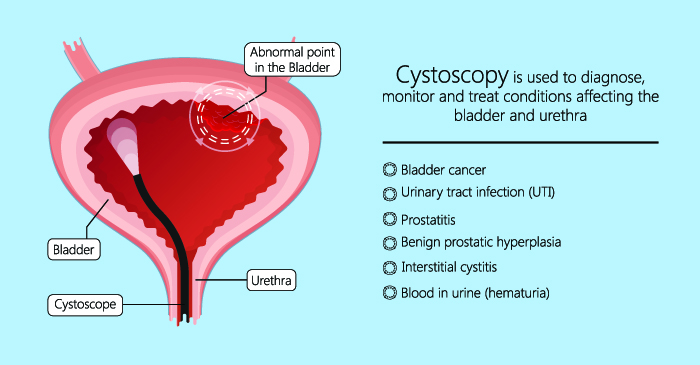Cystoscopy Treatment Treatment & Diagnostics in Chembur, Mumbai
Cystoscopy Treatment
Cystoscopy treatment is a surgical procedure that helps in examining the inner lining of the bladder and the urethra, which is a tube responsible for draining the urine out of the body. Cystoscopy is also sometimes known as cystourethroscopy.

What do we need to know about cystoscopy?
Cystoscopy treatment uses a medical instrument known as cystoscope. Cystoscope is a hollow tube which has a lens. It is inserted into the urethra and slowly moved ahead into the bladder for examination. Urology doctors and cystoscopy specialists perform the cystoscopy treatment for diagnosis, detection and treatment purposes.
To know more, search for a urology doctor near me or visit a urology hospital near you.
What are the basic symptoms that lead to cystoscopy treatment?
Your urology specialist may recommend a cystoscopy if you are experiencing:
- Persistent urinary tract infections
- Hematuria (blood in urine)
- Bladder stones
- Urinary retention or urinary incontinence
- Pain while urination
Why do you need cystoscopy treatment?
A urology specialist uses the cystoscopy treatment to detect, diagnose and treat urinary tract problems. Mainly cystoscopy treatment is used for:
- Bladder stones
- Bladder lining problems
- Bladder cancer
- Urinary tract infections
- Benign prostatic hyperplasia
- Bladder control problems
- Urinary fistulas
- Urethral strictures
Cystoscopy may also be used to place a catheter in the urinary tract.
When do you need to see a doctor?
In case you experience any of the issues mentioned above, visit a urology specialist for diagnosis.
You can request an appointment at Apollo Spectra Hospitals, Chembur, Mumbai.
Call 1860 500 2244 to book an appointment.
How is the procedure conducted?
Preparation
Usually, a urology doctor prescribes certain antibiotics beforehand, in case the patient has urinary tract infections (UTIs) or has weak immunity. They may also take a urine test for a better examination of the patient’s medical history. Cystoscopy treatment is performed mostly under the influence of anesthesia. In case there are some routine medicines taken for any other medical problem, the patient must discuss it beforehand with the urology doctor.
Procedure
- The patient must empty the bladder before the cystoscopy treatment. Anesthesia is given at the initial stage.
- The patient’s urethra is numbed with anesthetic gel or a spray.
- The urology doctor then lubricates the cystoscope and inserts it into the urethra.
- In case the cystoscopy is done for diagnosis, a flexible cystoscope is used, which is thin. In case the cystoscopy is being performed for biopsy or any other surgical treatment, a rigid cystoscope is used, which is thicker than a flexible cystoscope.
- The urology surgeon examines the bladder with the help of the lens attached with the cystoscope.
- To increase the visibility of the inside of the bladder, the urology doctor flushes the bladder with a sterile solution.
- Usually the whole procedure of cystoscopy takes from 5 to 15 minutes.
- The cystoscopy treatment results are discussed immediately or in a follow-up appointment with the patient. Any biopsy taken in the cystoscopy is sent to a laboratory and results may take more time.
What are the risks associated with cystoscopy treatment?
Cystoscopy is associated with the risks of pain, bleeding, swollen urethra and infection.
- Pain: One may experience pain in the abdominal region and some burning sensation during urination. The intensity of pain tends to decrease with time though.
- Bleeding: Blood may be spotted in urine after a cystoscopy procedure. This may sometimes turn into a serious issue.
- Swollen urethra: This condition is known as urethritis and is the most common risk. It causes difficulty in urinating.
- Infection: One may also get serious urinary tract infections after a cystoscopy. Although this happens very rarely.
Conclusion
Consult a cystoscopy specialist or visit a urology specialist near you in case the pain lasts for more than two days, bright red blood is spotted in urine or there is a persistent high temperature.
One must avoid exhausting activities and exercises after the cystoscopy treatment. Consult your urology doctor to know more.
Most people can return to their normal routine after resting for about 1 or 2 days following the treatment.
Usually you may not experience pain after the treatment. However, you may get a burning sensation while urinating for around 2 to 3 days after the treatment. There may also be some blood in the urine which will also last for 3 or 4 days maximum.
An abnormal cystoscopy report could denote bladder cancer or stones, urethral inflammation, polyps, cysts, prostate issues or even a congenital abnormality. Further examinations are needed to determine the specific issue.
Our Top Specialities
NOTICE BOARD
CONTACT US
CONTACT US
 Book Appointment
Book Appointment


.svg)
.svg)
.svg)
.svg)








